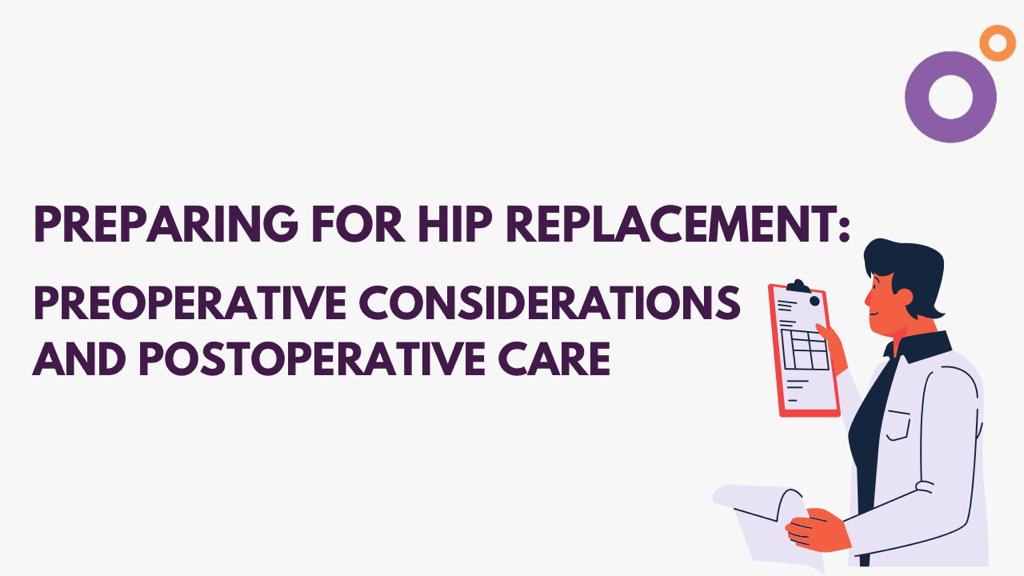
Preparing for Hip Replacement: Preoperative Considerations and Postoperative Care
Medically reviewed by

Dr. Akhil Bansal
MBBS, MS - Orthopedics
For people who are suffering from hip joint issues, hip replacement surgery is a significant medical treatment that can help increase mobility, lessen discomfort, and improve quality of life, resulting in more healthy and active life. But a satisfactory outcome can only come from thorough preoperative planning and meticulous postoperative care. In this article, we'll talk about crucial things to remember. If you are someone who will be going for a hip replacement, then you are at the right place. Patients can optimize their surgery experience and guarantee a quicker recovery by comprehending and adhering to these recommendations.
Preoperative Considerations:
Medical Evaluation:
1. Consultation with an Orthopaedic Surgeon: The first step is to schedule an appointment with a professional orthopaedic surgeon who is experienced in hip replacement surgeries. They will assess your complete condition, review your medical history, and discuss the surgical procedure in detail, what needs to be done further, and how the treatment will go in the future.
2. Diagnostic Tests: Your surgeon will tell you to get certain imaging tests, such as X-rays or MRI scans, to evaluate the extent of damage to the hip joint and plan the surgery accordingly so that everything goes on smoothly.
Lifestyle Modifications:
1. Weight Management: It is very important for a person suffering from hip joint issues to maintain a healthy weight; it can significantly reduce stress on the hip joint and enhance surgical outcomes. You can consult with a healthcare professional or nutritionist for a balanced diet and exercise regimen. If you are overweight, then it can create problems for you and might also lead to an unsuccessful surgery.
2. Smoking Cessation: : If you are someone who is addicted to smoking, then your surgeon would advise you to quit smoking before surgery. It is strongly recommended, as smoking can impair healing and increase the risk of further complications.
3. Alcohol restriction
4. Stop medicine that causes hip ailments
Preoperative Preparations:
1. Medication Review: It is very important to inform your surgeon about all medications you have been taking, including prescription drugs, over-the-counter medications, and supplements, as some may need to be temporarily adjusted or discontinued before surgery so that no complication occurs in the future.
2. Blood Tests: Your surgeon may order blood tests to assess your overall health and check for any underlying medical conditions that may affect the surgery or recovery process.
3. Preoperative Rehabilitation: Depending on your medical condition, your surgeon may recommend physical therapy or exercises to improve joint strength and flexibility before surgery.
Postoperative Care:
Hospital Stay:
1. Pain Management: After your surgery, to relieve you from pain, your healthcare team will provide appropriate post-op analgesics that you may not face any problems.
2. Physical Therapy: A physical therapist will work with you to initiate gentle exercises and help you with walking and mobility to promote healing and restore strength.
3. Deep Breathing and Coughing Exercises: These exercises prove to be very helpful in preventing respiratory complications and improving lung function.
Home Recovery:
1. Wound Care: Patients need to be very careful and follow the instructions provided by their surgeon for keeping the surgical incision clean and dry to minimize the risk of infection.
2. Medication Management: : Take prescribed medications as directed, including pain medications, antibiotics (if prescribed), and blood thinners (if recommended).
3. Assistive Devices: Use assistive devices, such as crutches or walkers, as instructed by your healthcare team to aid in mobility and prevent falls.
4. Physical Therapy: It is important to attend scheduled physical therapy sessions to continue exercises, gradually increase activity levels, and regain strength and flexibility.
Lifestyle Adjustments:
1. Home Modifications:Make sure you make necessary modifications to your home environment to ensure safety and ease of movement, such as removing rugs or installing handrails.
2. Follow Activity Restrictions: Follow your surgeon's instructions regarding any activity restrictions, gradually increasing physical activity as permitted during follow-up consultations.
3. Nutritional Support: Try to maintain a balanced diet rich in essential nutrients to support healing and improve your overall health.
Preparing for hip replacement surgery involves a variety of factors, including medical evaluations, lifestyle modifications, and preoperative preparations. Careful postoperative care after surgery, such as pain management, physical therapy, and lifestyle changes, is essential for a complete and quicker recovery. You may optimise your surgical outcome, regain mobility, and have a higher quality of life by following the advice of your healthcare team. Always seek personalised guidance and suggestions from your orthopaedic physician throughoutthe process.